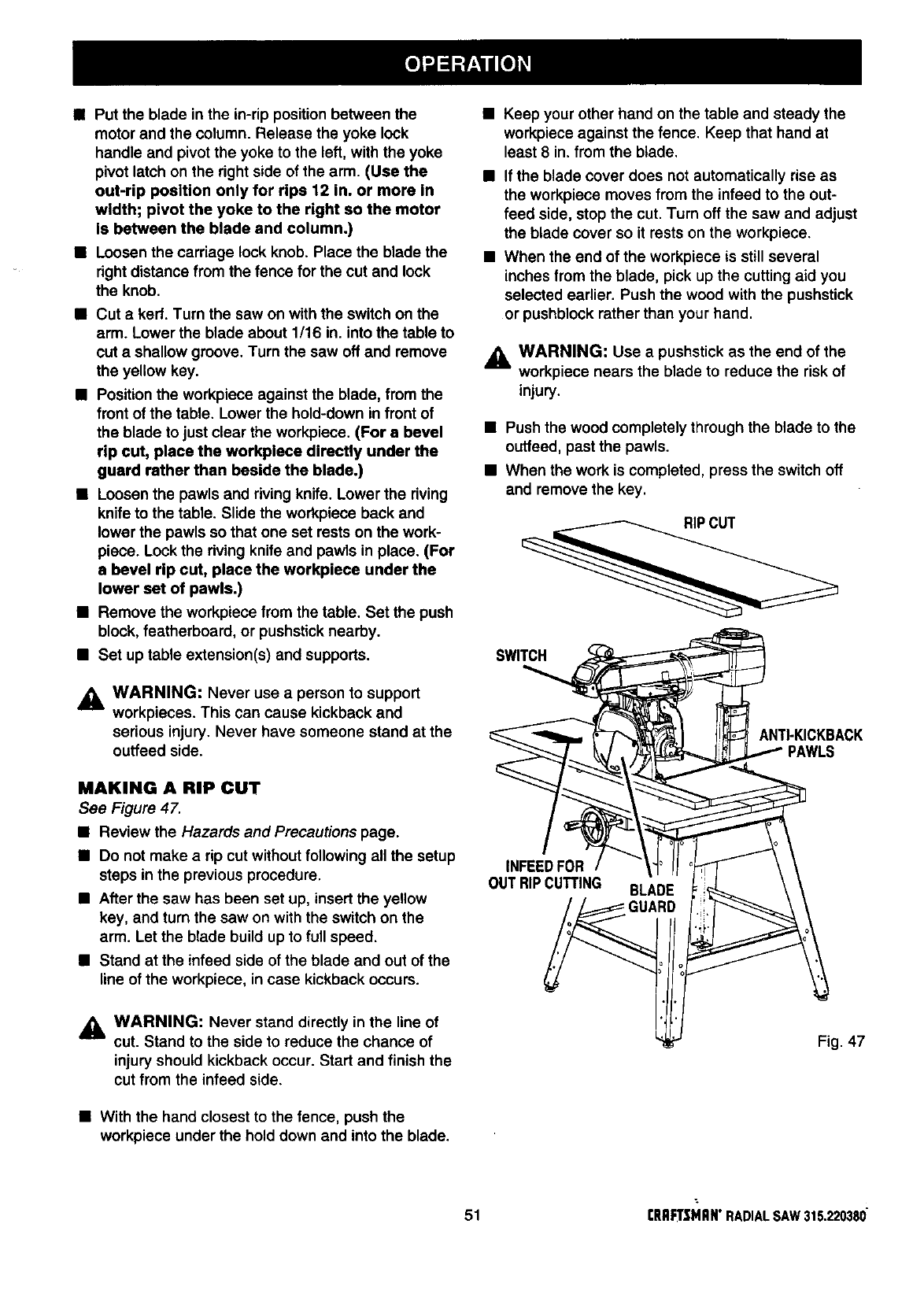
• Put the blade in the in-ripposition between the
motor and the column. Release the yoke lock
handle and pivot the yoke to the left, with the yoke
pivot latch on the right side of the arm. (Use the
out-rip position only for rips 12 in. or more in
wldth; pivot the yoke to the right so the motor
is between the blade and column.)
• Loosen the carriage lock knob. Place the blade the
right distance from the fence for the cut and lock
the knob.
• Cut a kerf. Turn the saw on with the switch on the
arm. Lower the blade about 1/16 in. into the table to
cut a shallow groove. Turn the saw off and remove
the yellow key.
• Position the workpiece against the blade, from the
front of the table. Lower the hold-down in front of
the blade to just clear the workpiece. (For a bevel
rip cut, place the workplece directly under the
guard rather than beside the blade.)
• Loosen the pawls and riving knife. Lower the riving
knife to the table. Slide the workpiece back and
lower the pawls so that one set rests on the work-
piece° Lock the dving knife and pawls in place. (For
a bevel rip cut, place the workpiece under the
lower set of pawls.)
• Remove the workpiece from the table. Set the push
block, featherboard, or pushstick nearby.
• Set up table extension(s) and supports.
,_ WARNING: Never use a person to support
workpieces. This can cause kickback and
serious injury. Never have someone stand at the
outfeed side.
MAKING A RIP CUT
See Figure 47.
• Review the Hazards and Precautions page.
• Do not make a rip cut without following all the setup
steps in the previous procedure.
• After the saw has been set up, insert the yellow
key, and turn the saw on with the switch on the
arm. Let the blade build up to full speed.
• Stand at the infeed side of the blade and out of the
line of the workpiece, in case kickback occurs.
• Keep your other hand on the table and steady the
workpiece against the fence. Keep that hand at
least 8 in. from the blade.
If the blade cover does not automatically rise as
the workpiece moves from the infeed to the out-
feed side, stop the cut. Turn off the saw and adjust
the blade cover so it rests on the workpiece.
• When the end of the workpiece is still several
inches from the blade, pick up the cutting aid you
selected earlier. Push the wood with the pushstick
or pushblock rather than your hand.
_i, WARNING: Use a pushstick as the end of the
workpiece nears the blade to reduce the risk of
injury.
• Push the wood completely through the blade to the
ouffeed, past the pawls.
• When the work is completed, press the switch off
and remove the key.
SWITCH
ANTI-KICKBACK
PAWLS
INFEEDFOR
OUTRIPCUTTING BLADE
_ WARNING: Never stand directly in the line of
cut. Stand to the side to reduce the chance of
injury should kickback occur. Start and finish the
cut from the infeed side.
• With the hand closest to the fence, push the
workpiece under the hold down and into the blade.
Fig. 47
51 CRAFT._I_RN"RADIALSAW315.220380:


















